![]()
Wed, Nov 30, 2011

Bahrain is a small, predominantly Shi'ite island country ruled by a Sunni royal family. Its proximity to Iran and basic political-societal environment have made it an attractive target for Iranian subversion.
Iranian terrorist cell exposed in Bahrain
Originally published by the Meir Amit Intelligence and Terrorism Information Center: “A terrorist cell was recently exposed in Bahrain which planned to attack Bahraini and Saudi Arabian targets. The attacks, attributed by the Bahraini and Saudi media to Iran, may be part of a terrorist campaign waged by Iran against Saudi Arabia and its allies.”
Exposure of the terrorist cell in Bahrain which planned a series of attacks in Bahrain, handled by the Iranian Revolutionary Guards
A terrorist cell was recently exposed in Bahrain, which according to the Bahraini and Saudi media, was run by the Iranian Revolutionary Guards. The cell planned to attack the following targets:
1) The King Fahd Causeway linking Bahrain and Saudi Arabia.
2) The Saudi embassy in Bahrain.
3) The Bahraini ministry of the interior.
Saudi and Arab media accused the Iranian Revolutionary Guards of running the terrorist cell. On November 14, 2011 the Saudi paper Okaz reported that the cell operatives admitted that members of the Revolutionary Guards were behind the plot to blow up the Saudi embassy and the King Fahd Causeway.
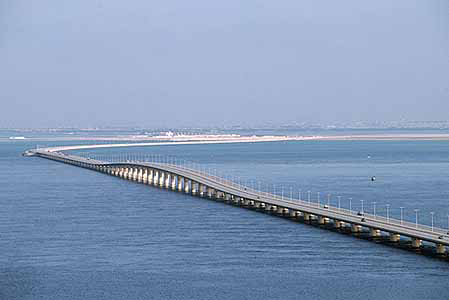
The King Fahd Causeway connecting Bahrain to Saudi Arabia, an important strategic route linking the two countries. The terrorist cell exposed in Bahrain was planning to sabotage the bridge.
General Tariq al-Hassan, spokesman for Bahrain’s ministry of the interior, said that four of the cell’s operatives had been detained in Qatar and deported to Bahrain on November 4, 2011. The fifth operative was detained in Bahrain. According to al-Hassan, the four who were detained in Qatar arrived there from Saudi Arabia. They were found to be carrying documents and a computer containing security information and details about several vital targets. Dollars and Iranian rials were also found in their possession. Under interrogation they confessed to leaving Bahrain illegally and going to Iran to establish an organization which would carry out terrorist attacks in Bahrain (Agence France-Presse, date, 2011).
Members of the Bahraini parliament said that the “terrorist plot” exposed was not directed only against Bahrain but intended to attack the Arab identity of the the Gulf States. They thanked Qatar for helping them expose the cell and demanded greater inspection and supervision of the border crossings on land, at sea and in the air to prevent terrorist cells from entering Bahrain. They noted that an attack on the King Fahd Causeway the terrorist operatives would cut off the land connection between Bahrain and Saudi Arabia, creating a focal point of tension. Members of the Bahraini parliament also accused the Lebanese terrorist organization Hezbollah of having ties to the cell; Hezbollah issued a sweeping denial of the allegations (Intiqad website, November 15, 2011).[1]
Following the exposure of the cell, the Saudi media savagely attacked Iran, claiming that the “threads of the conspiracy” led to Iran and that Iran was “a terrorist state” seeking to establish a Shi’ite base in Bahrain.
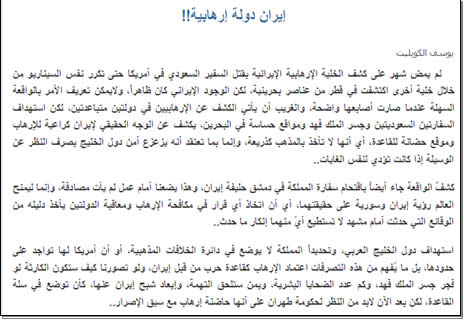
The article in the Saudi daily newspaper Al-Riyadh. The headline reads "Iran is a terrorist state" (Alriyadh.com).
On the practical level, it was reported that the Saudi security authorities were planning to appoint a special task force to protect Saudi diplomats and a unit to secure the King Fahd Causeway (Al-Hayat, November 15 and 16, 2011). The role of the task force would reportedly be to protect Saudi ambassadors around the world, Saudi diplomatic delegations abroad and foreign diplomats serving in Saudi Arabia. The force would be composed of commandos, supervised by the general security service and subordinate to the ministry of the interior (Daralhayat.com website).
Background and significance
The series of terrorist attacks prevented in Bahrain were part of an Iranian campaign against Saudi Arabia and its allies. The campaign is several months old and makes use of a variety of tactics, including personal attacks targeting Saudi diplomats, subversion and propaganda. The concrete motive and catalyst for the campaign were, in our assessment, the entrance of Saudi forces into Bahrain under the flag of the Gulf Cooperation Council on March 14, 2011, and the containment of the Shi’ite protests in Bahrain. The protests, influenced by the current general regional instability, demanded that King Hamad al-Khalifa carry out a series of social and political reforms. In our assessment, the events marked Saudi Arabia as leading a campaign in Bahrain and the Persian Gulf against Iran, and in retaliation Iran is using the Quds Force to punish both Saudi Arabia and Bahrain.
Iran initiated two other attacks against Saudi Arabia in the recent past.
1) An attempt on the life of Adel al-Jubeir, Saudi ambassador to the United States, was prevented: On September 29, 2011, American security forces detained a man with dual American-Iranian citizenship working for the Quds Force. His Quds Force handler successfully fled to Iran. According to the American administration, top figures in the Iranian regime were involved in the plot, as part of what was referred to as Iran’s “reckless and dangerous” behavior. Following the exposure of the plot the United States initiated a series of diplomatic and practical steps against Iran.[2]
2) The killing of a Saudi diplomate in Pakistan:
A. On May 16, 2011, Hassan al-Khatani, a security officer with the Saudi delegation in Karachi was shot dead in his car by two men riding a motorbike who fired four rounds. Four days previously two hand grenades were thrown at the front gate of the consulate (The Guardian, May 16, 2011). Saudi and American sources believe that the Iranian Quds Force was behind the attacks (Washington Post, October 13, 2011).
B. According to a November 22 posting on the Dar al-Hayat website, the Pakistani security services solved both cases following the detention of an armed cell belonging to a Shi’ite organization called Jaish-e-Mohammed (the army of Muhammad), outlawed in Pakistan. According to the posting, which relied on Pakistani sources, the organization receives support and military training from Iranian Revolutionary Guards and Hezbollah operatives. The cell members confessed to having committed a number of terrorist attacks including shooting at the Saudi consulate a number of days before the killing of the Saudi diplomat.
Iran’s subversive and terrorist activity against Saudi Arabia and its allies was accompanied, as usual, by a wave of propaganda and displays in the Persian Gulf:
1) The Ayatollah Ahmad Jannati, secretary of the Iranian Guardian Council, was severely critical of the involvement of the forces of the Gulf Cooperation Council in the Gulf of Bahrain (Bahrain News Agency, July 18, 2011). In response the Council sent an official communiqué referring to Jannati’s remarks as “provocative” and calling them unwanted intervention in Bahrain’s internal affairs. Iran responded with its own communiqué rejecting that of the Council (Fars News Agency, Iran, July 21, 2011).[3]
2) Iran’s Mehr News Agency was severely critical of Saudi policy toward the country’s Shi’ites. It claimed that even the Western media compared the oppression and discrimination against the Shi’ites in eastern Saudi Arabia to South Africa’s apartheid policies (Mehr News Agency, Iran, October 14, 2011).
3) The Iranian daily newspaper Kayhan claimed that Saudi Arabia collaborated with the United States and Israel in assassinating high-ranking figures belonging to the so-called “Islamic resistance” and in Iran. Attacks on high-ranking members of the Islamic movement in Lebanon, Pakistan, Iraq and Afghanistan and on the lives of Iran’s nuclear scientists were planned, according to Kayhan, by the crisis-ridden United States, Britain, France, Germany, Israel and Saudi Arabia to keep the West and the Saudi regime from collapse (Kayhan, October 16, 2011).

Media coverage of the visit of Iranian Supreme Leader Khamenei to the Iranian naval facilities along the Persian Gulf (July 2011)
In both terrorist attacks described above (the United States and Pakistan) the Quds Force, an elite unit of the Revolutionary Guards, was an instrument used to carry out Iranian policy. The Force has been assigned the task of exporting the revolution beyond the borders of Iran by using a wide variety of covert actions, among them subversion and terrorism. Following the exposure of the plan to attack the Saudi ambassador to the United States, General Qassem Suleimani, commander of the Quds Force, was added to the list of specially designated global terrorists. The reason given was that he “oversees the IRGC-QF officers who were involved in this plot.”[4] As to other attacks recently prevented in Bahrain, if they were really orchestrated by Iran as the Bahrain authorities claim, it can be assumed that the Quds Force spearheaded them as well.
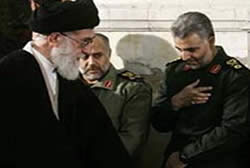
Qassem Suleimani, right, commander of the Quds Force, bows his head before Supreme Leader Ali Khamenei (Asriran.com website, July 2, 2011).
The Bahrain aspect
Bahrain has a population of more than one million, most of them foreign nationals. The number of native Bahrainis is between 718 and 766 thousand. Most of Bahrain’s population is Arab but there is a substantial Iranian minority. About 85% of the population is Muslim, and 60% of them are Shi’ites (or 70% according to a different source). Marriages between Shi’ites and Sunnis are rare, they have different names and speak different dialects. The rest of the population, about 15%, are local Christians, Hindus and resident of Iranian origin. There are also between 30 and 40 thousand Jews living in Bahrain.[5]
It was not at random that Iran chose Bahrain as an arena for its terrorist activities. The Shi’ites in Bahrain have a history of both quiet and violent protest concerning various issues on the local Bahraini and regional Shi’ite agenda, and Iran has an important role in fomenting subversion and incitement. Internet use in Bahrain has expanded greatly, especially with regard to blogs and online forums used to criticize the continuing exclusion of Shi’ites from politics and the economy, and the slow processes of instituting reforms and democratizing the country. The Shi’ites in Bahrain identify with the Shi’ites in Iraq, Lebanon and Iran, and participate in the anti-Israeli propaganda displays orchestrated by Iran, such as Jerusalem Day. They are a focus for the anti-regime protest, part of the wave which has swept over the Arab world. However, so far the Bahraini regime has managed to contain the protests with the help of Saudi Arabia and the forces of the Gulf Cooperation Council which entered the country.
In addition to its internal problems, which play into the hands of Iran in its attempts at subversion, Bahrain’s foreign policy is transparently pro-American and supports America’s war effort. Bahrain hosts the America’s largest naval base in the Gulf, NAVCENT, home to the 5th Fleet. Operations are carried out from the base to support America’s war efforts in Iraq and Afghanistan, and to secure the sea lanes in the Persian Gulf. Bahrain hosts NAVCENT despite local protests and criticism, especially from the Shi’ite population (in all probability instigated by Iran). The Shi’ites claim that the large American base in Bahrain is a source of “moral corruption” and threatens Iran. Moreover, at the beginning of 2010 Bahrain agreed to allow a battery of missiles to be deployed on its soil to cope with an Iranian threat to itself and Kuwait, Qatar and the United Arab Emirates.[6]
The Iranian aspect
Iran claims historical justification for sovereignty over Bahrain because it was under Persian control from 1602 to 1783. In 1968, when Britain announced the planned withdrawal of its troops from the Persian Gulf, Iran renewed its demand for sovereignty over the island. In a referendum conducted under the aegis of the UN in 1970, the residents of Bahrain had to vote between independence and annexation to Iran. They chose independence, which they received in 1971, and as a result the Shah, Mohammad Reza Pahlavi, did not raise the issue again. Since the Islamic Revolution, Iran has occasionally claimed that Bahrain is one of its provinces. Iran, in a dispute with the United Arab Emirates, also claims ownership of three islands of important strategic value.[7]
In the middle of February 2009, Ali Akbar Nateq Nouri, office supervisor and advisor to the Supreme Leader Khamenei, said that before Bahrain received independence in 1970, it was Iran’s 14th province, and was even represented in the Iranian parliament (Majlis). His remark (not the first of its kind) provoked stormy reactions in Bahrain and led to another crisis in Bahraini-Iranian relations, which has since been settled. The incident also reflected the tensions between Iran and the Arab world, and exposed the full force and extent of the basic differences between Iranian and Arab identity. At the time it led to many Arab displays of solidarity with Bahrain. Prominent among them were the visits of Hosni Mubarak, president of Egypt, and King Abdallah of Jordan, and the announcement that Morocco was severing its diplomatic ties with Iran (March 2009).[8]
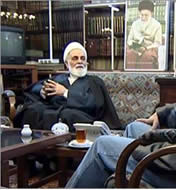
Ali Akbar Nateq Nouri, advisor to Supreme Leader Khamenei (Al-Jazeera TV, February 22. 2009). His claim that Bahrain was once the 14th province of Iran reawakened tensions between the two countries and caused a storm in the Arab world.
In recent decades the presence of a large, embittered Shi’ite population identifying with Iran has turned Bahrain into an attractive target for Iranian subversion. In the early 1980s and into the 1990s, Bahrain repeatedly accused Iran of carrying out subversive activities on its soil, especially after the exposure of a cell of an organization called “The Military Wing of Hezbollah Bahrain.”[9] In September 2010 hundreds of opposition activists were detained on suspicion of plotting against the Bahraini government. Since then Iran has continued its subversion and terrorism in Bahrain, examples of which were recently exposed. Its objective is to destabilize the government and lessen Saudi and Western influence, and to convince the Shi’ite population to recognize Khamenei as their source of religious authority (so far without success).
The recent prevention of three showcase terrorist attacks in Bahrain, two of which were directed at Saudi targets, is clearly illustrates Iran launched an organized campaign against Saudi Arabia and its allies. The campaign includes propaganda, subversion and terrorist activity. It is meant to harm the interests of the United States, Saudi Arabia and the Gulf States, and to promote Iran’s aspirations for regional hegemony, in both the Persian Gulf and the entire Middle East. However, Iranian support and its strengthening of the self confidence of Bahrain’s Shi’ite population, considering the regional wave of protests, may channel the disappointments of the Shi’ite opposition from a parliamentary attempt to a return to violent protests and reawaken sectarian tensions in Bahrain, making them look toward Iran.
Notes:
[1] Hezbollah claimed the allegations were false and that and a poor attempt by the Khalifa to camouflage the truth behind Bahrainis’ quiet civilian revolution.
[2] For further information see the November 3, 2011 bulletin “The United States foiled an Iranian plot to assassinate the Saudi ambassador in Washington using Quds Force, a Revolutionary Guards elite unit, the main instrument for subversion and terrorism outside of Iran. The plot indicates a growing readiness by the Iranian regime to take risks in its fight against the U.S.” at http://www.terrorism-info.org.il/malam_multimedia/English/eng_n/pdf/iran_e138.pdf.
[3] From “GCC-Iran Foreign Relations,” and article in Iran Tracker, July 21, 2011.
[4] Quoted from a House hearing following the attempted assassination of the Saudi Arabian ambassador. For further information see the April 2, 2007 bulletin “Using the Quds Force of the Revolutionary Guards as the main tool to export the revolution beyond the borders of Iran” at http://www.terrorism-info.org.il/malam_multimedia/English/eng_n/pdf/iran_e0307.pdf.
[5] EIU Data Services, February 5, 2009.
[6] From an article by Dr. Emily Landau, senior research associate at the Institute for National Security Studies (INSS) and director of the Arms Control and Regional Security Project in Tel Aviv (Wallah website, February 18, 2011).
[7] The three islands, Abu Musa and the Greater and Lesser Tunbs, are situated in the Persian Gulf and control the Straits of Hormuz, through which oil tankers pass on their way to foreign markets. In 1992 Iran completed its takeover of Abu Musa, built a naval base and deployed missiles along the coast. The United Arab Emirates claim the island and are supported by members of the Gulf Cooperation Council (GCC). Iran rejects the claim and the issue is a bone of contention between Iran and Gulf States.
[8] For further information see the March 2, 2009 bulletin “Iran and the Persian Gulf…” at http://www.terrorism-info.org.il/malam_multimedia/English/eng_n/pdf/iran_e005.pdf.
[9] “Hezbollah Bahrain” was an organization established with Iranian support after the Islamic Revolution to increase Iran’s influence in Bahrain, part of its policy to export the revolution. The organization’s stated goals were to overthrow the House of Khalifa, the ruling family of Bahrain, to establish a Shi’ite regime similar to Iran’s and to cut Bahrain off from the Gulf Cooperation Council. In December 1981 the organization, headed by Taki Mudarisi, attempted a putsch and many of its operatives were killed. In 1996 Bahrain detained dozens of its operative, claiming that they were trained and funded by the Revolutionary Guards and Iranian intelligence to overthrow the regime.



 RSS
RSS

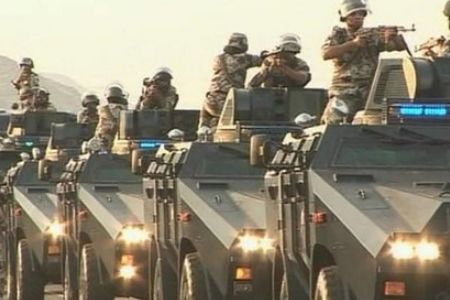
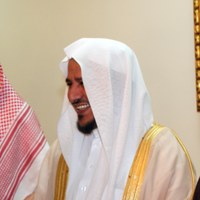
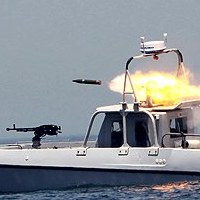
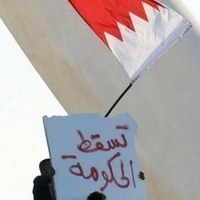

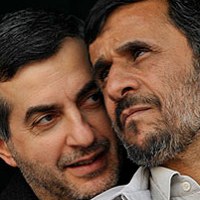




Iranian terrorist cell exposed in Bahrain | Middle East, Israel, Arab World, Southwest Asia, Maghreb http://t.co/snQkfuod
Iranian terrorist cell exposed in Bahrain | Middle East, Israel, Arab World, Southwest Asia, Maghreb http://t.co/snQkfuod
http://t.co/ecmaHsKT Iranian terrorist cell exposed in Bahrain | Middle East, Israel, Arab …